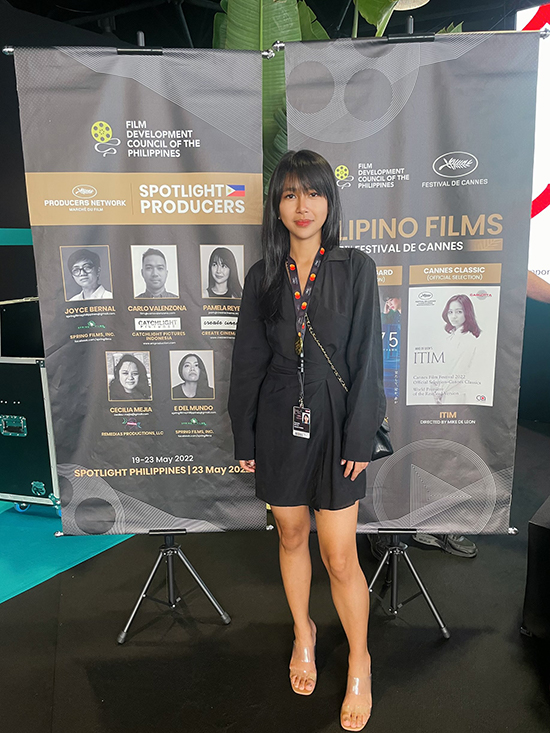Pamela L. Reyes: The film industry’s game-changer
Preparing to interview Pamela L. Reyes, one of our country’s youngest film producers, I had to repeatedly rehearse my questions to make sure that I could still enunciate words. Talking to someone that successful felt very intimidating. However, Pamela was extremely easy to talk to; the interview felt like I was having a conversation with a friend.
Birdshot, one of the movies she produced, opened up Philippine Cinema to a wider international audience by being the first Filipino film released worldwide by Netflix. Not only that, but the success of her movies, which I think are very different from the usual tropes and storylines we see in the mainstream, is a testament to the height of success our films can achieve if we only give other stories a chance.

With a decade of filmmaking, Pamela’s an inspiration not just for future filmmakers but for anyone aspiring to be agents of change in their industry.
Young STAR got the chance to speak to Pamela about her impressive career.
YOUNG STAR: How did your filmmaking journey start?
PAMELA L. REYES: When I was young, I started dabbling in the arts, particularly drawing and painting. Thinking that I would pursue a career in character design and graphic design, I took up a Fine Arts degree in Visual Communications at the University of the Philippines. During my production design class under renowned production designer Cesar Hernando, I fell in love with cinema. I wrote and directed my first film, Debut, which was selected in the 2011 Cinemalaya Film Festival.
Once I graduated UP, I held a role in DDB Group Philippines’ Bent & Buzz as a creative producer, but one week later, I quit my job. This was the time when Rekorder was shortlisted in the 2013 Cinemalaya Competition. I knew in my heart that making films was what I wanted to do.
Birdshot is the first Filipino film released worldwide by Netflix. What was the experience like?
I was lucky to have met TBA studios, the production company behind General Luna. At 21, I was doing legal negotiations with them. Imagine this young kid, asking a production company for a huge sum of money. I like to believe that I had grit and that age is but a number.

In the end, they did trust us. Birdshot went on to win awards during the 29th Tokyo International Film Festival, 2017 Pista ng Pelikulang Pilipino, and became the Philippine’s Official Entry for the 2018 Academy Awards.
This opened a lot of doors for me. I was getting a lot of offers to produce and direct different films. Birdshot changed my career in a way that I’m now able to go through my career more easily than before.
With more than a decade of experience under your belt, what has been your favorite part of your filmmaking career so far?
My favorite part, at least now, is that I found the people I want to work with. These are the people who are aligned with my visions and principles. That’s how I was able to build Create Cinema with E del Mundo.

With this boutique production house, we want to create ripples of change within the film industry. Not only are we aiming to create groundbreaking films, we are also fostering a culture that pays people on time, pays people the right amount, and does not work them overtime. Likewise, we in Create Cinema take the extra effort to check on our people’s mental health and well-being. To us, our people are very important, since they’re the ones who make the film.
I heard Create Cinema is accepting script pitches through its website. Why is it important to you to include this option?
In the film industry, there’s a lot of gatekeeping. How does someone, who doesn’t know anyone, talk to the people who can help them make their film happen? For us, it doesn’t matter who you are, as long as the script is really good, we will help you.
You’re also a mentor who has a heart for young up-and-coming filmmakers. Why is mentorship a rewarding pursuit for you?
I want to pursue mentorship because when I was starting, I never had one. It was difficult since a lot of producers wanted to compete with me, but I didn’t see it as competition. The competition is outside the country. What I want is to help other people, since it feels good when someone is guiding you. It makes you feel less scared.
Talking about difficulties, what were the roadblocks you’ve encountered in your career?
People keep on saying that I’m too young. I’ve been doing this for the past 10 to 11 years, when am I old enough? People should remove the notion that when you’re young, you know nothing. The whole industry is changing and I hope we’ll be more open to the ideas of younger people.
Likewise, being a woman is difficult (in the industry). I have to work twice as hard to prove myself. Even with a better portfolio, I have a harder time than my male counterparts. As an authority figure on set, people expect me to tone myself down.
How did you overcome these and the other challenges you’ve encountered?
I’m the type of person who doesn’t easily get discouraged. Someone told me, when I was starting in the industry, that you cannot have an ego. Having an ego will be your downfall. Even now, I accept that I don’t know everything, and because of this, I never stop learning. I also ask people who are more experienced than I am. If you never ask, the answer is always no.
One of the things I’ve observed in your films is that they are politically and socially conscious. What do you think is the role of films during this time in our country?
I always go back to this quote: “How can you be an artist and not reflect the times?” Film, in itself, is a protest. Politics is something you can never remove from stories. It’s our lives. If you’re ignoring these truths, you’re not telling the complete story. For me, a film without a stance or an opinion is empty.
Finally, what is your message to aspiring filmmakers in the country?
It’s a great time to make films. The Philippines is so rich in stories. Look everywhere around you. As times are changing, we have the responsibility to put out stories that aren’t empty. Do not be afraid to tell stories that will influence one person to do better.


